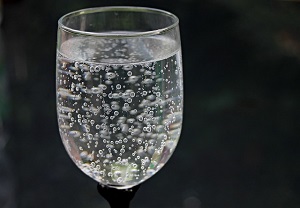Misunderstandings and truths about sparkling water, also known as carbonated water or soda water, can sometimes arise due to misconceptions or misinformation. Let’s explore some of these misunderstandings and the corresponding truths:
-
Misunderstanding
Sparkling water dehydrates you: Some people believe that because of its carbonation, sparkling water can dehydrate the body. This misunderstanding likely stems from the idea that carbonated beverages cause dehydration.
-
Truth
Sparkling water, like still water, contributes to your daily fluid intake and does not cause dehydration. It’s a suitable alternative to plain water for staying hydrated. However, excessive consumption of any beverage, including sparkling water, could potentially lead to a temporary diuretic effect, which may increase urination. But this doesn’t result in overall dehydration as long as you balance it with adequate water intake.
-
Misunderstanding
Sparkling water erodes tooth enamel: There’s a common belief that the acidity in sparkling water can lead to tooth enamel erosion, similar to what happens with sugary soft drinks.
-
Truth
While carbonated water is slightly more acidic than still water, it is not as acidic as sugary or acidic beverages like soda or fruit juices. The pH levels in most commercially available sparkling water are generally considered safe for teeth and do not contribute significantly to enamel erosion. However, it’s essential to practice good dental hygiene and not consume excessive amounts of acidic drinks to protect your teeth.
-
Misunderstanding
Sparkling water causes bone issues: Some people associate the carbonation in sparkling water with adverse effects on bone health, such as reducing bone density or causing osteoporosis.
-
Truth
Current research suggests that moderate consumption of sparkling water does not have a detrimental effect on bone health. The carbonation in sparkling water comes from carbon dioxide, not phosphoric acid (found in many sodas), which has been associated with bone mineral density loss. As long as you have an adequate calcium intake through your diet, sparkling water should not negatively impact your bones.
-
Misunderstanding
Sparkling water contains harmful chemicals: There are misconceptions that sparkling water contains harmful additives or chemicals that are detrimental to health.
-
Truth
In most cases, commercially available sparkling water is simply carbonated water with no harmful additives. Be sure to check the label of the specific brand you choose to ensure it doesn’t contain any undesirable ingredients. Generally, sparkling water is considered safe for consumption.
-
Misunderstanding
Sparkling water leads to weight gain: Some people believe that the carbonation in sparkling water can lead to weight gain.
-
Truth
Plain sparkling water without added sugars or calories does not directly cause weight gain. In fact, it can be a better option than sugary beverages for those looking to manage their weight because it is calorie-free.
Many individuals consume sparkling water without any issues and find it a refreshing alternative to plain water. If you enjoy sparkling water and it doesn’t cause any discomfort, there is usually no reason to be concerned about its impact on your digestive organs.
But It’s important to note that the effects of sparkling water on the digestive system can vary significantly from person to person. Some people may experience discomfort or abdominal distension after consuming carbonated beverages.
As with any food or beverage, moderation is essential, and individual responses to sparkling water may vary. It’s crucial to make informed decisions based on accurate information rather than misunderstandings and to consider your own health needs and preferences when choosing beverages.

